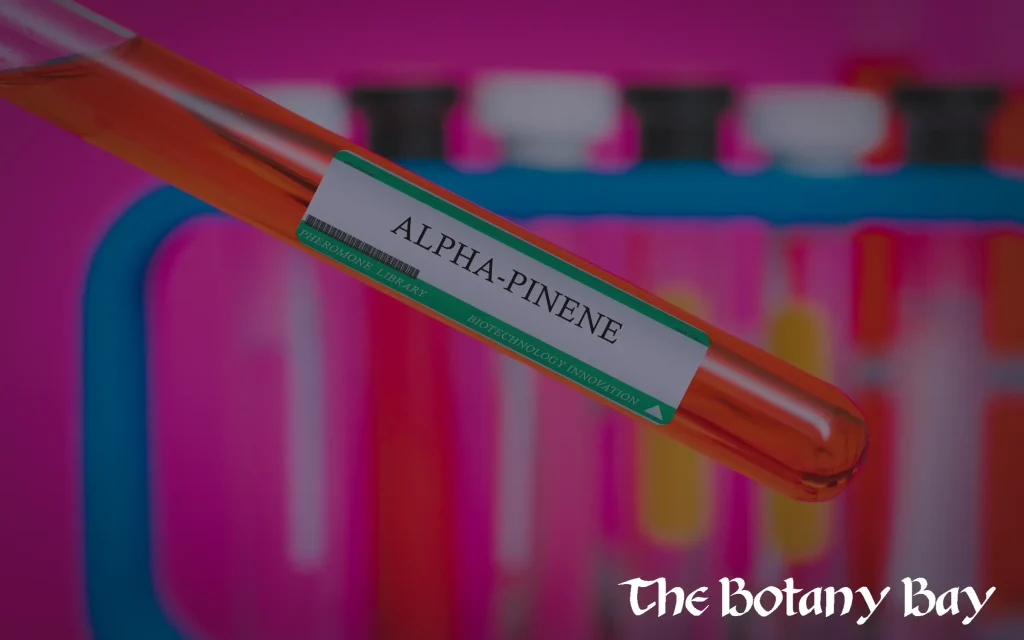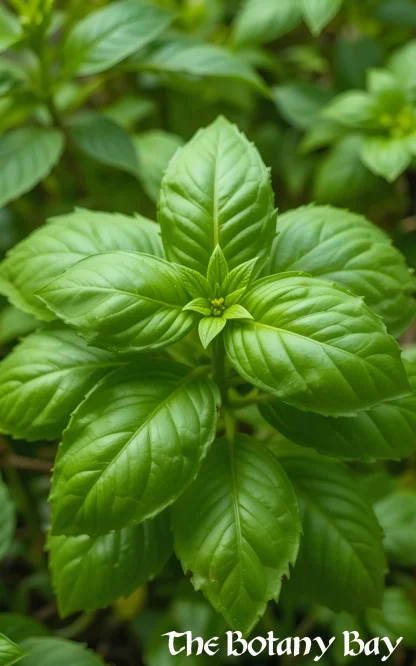Understanding Alpha-Pinene
Your Comprehensive Guide to α-Pinene
At The Botany Bay, we believe in exploring the full spectrum of natural compounds found in hemp, cannabis, and botanicals. α-Pinene, also known as alpha-pinene, is one of the most abundant terpenes in nature. It contributes to the fresh, pine-like aroma of many plants and is also studied for its potential to support alertness, clarity, and respiratory function.

What Is α-Pinene?
α-Pinene is a naturally occurring terpene found in many conifer trees, rosemary, basil, eucalyptus, and various strains of cannabis. It is part of the larger class of compounds called monoterpenes, which are known for their strong aromatic properties.
It’s one of the most common terpenes in nature and is biosynthesized by plants as a defense mechanism — deterring pests and protecting against pathogens.
How α-Pinene Works in the Body
Though more research is needed, α-Pinene is believed to interact with multiple biological pathways. Preliminary studies and traditional use suggest that it may:
Influence acetylcholine breakdown, which plays a role in memory and alertness
Support bronchodilation, potentially easing airflow
Offer aromatic or mood-stabilizing benefits when inhaled
In cannabis, α-Pinene may play a role in what’s known as the entourage effect — where terpenes and cannabinoids interact to produce nuanced effects.
These effects are based on user reports and limited studies. They are not intended to imply medical benefits.

Natural Sources of Alpha-Pinene
α-Pinene is one of the most widespread terpenes in nature. While it’s famously associated with pine trees, it’s also present in a surprising variety of plants, fruits, and herbs. Common sources include:
Pine needles and other conifers (cedar, fir, spruce)
Herbs like rosemary, sage, basil, dill, and parsley
Citrus fruits, including limes, lemons, and oranges
Eucalyptus leaves
Some cannabis and hemp strains with piney or earthy aromas
Certain spices, such as nutmeg and cumin
The amount of α-Pinene varies widely from plant to plant. For example, conifer essential oils can be rich in α-Pinene, while citrus peels contain it in smaller amounts alongside dominant terpenes like limonene.
Tip: If you’ve ever crushed a rosemary sprig or peeled a fresh lime and caught a subtle forest-like note under the citrus scent, you’ve experienced α-Pinene in action.
Natural Sources of α-Pinene
More than just cannabis. Flip to learn more.
Alpha-pinene is found in pine needles, rosemary, sage, basil, and even orange peels. It’s responsible for the crisp, fresh scent of pine forests.
What Does α-Pinene Do in Hemp?
Beyond aroma – flip the box for more info.
In hemp and cannabis, α-Pinene is often associated with clear-headed effects and alertness. Some strains high in this terpene are described as energizing or focused.
Legal Status of α-Pinene
α-Pinene is a naturally occurring compound and is fully legal in the United States. It is widely used in:
Aromatherapy products
Essential oils and natural cleaners
Terpene blends in cannabis and hemp products
Because it is derived from common plants and not intoxicating, α-Pinene is not regulated as a controlled substance.

Reported Effects and Benefits of α-Pinene
User reports and early research suggest α-Pinene may offer:
A sense of mental clarity or sharpness
A refreshing, uplifting aroma
Potential respiratory support through inhalation
Mild mood balancing properties
It is commonly included in sativa-leaning cannabis strains, or in focus-enhancing terpene blends.
These reported effects are anecdotal and not intended as medical guidance.
How to Use α-Pinene
While you may naturally encounter α-Pinene in herbs or outdoor air, it is also available in:
✅ Terpene Blends
Used to customize the aroma and character of hemp and cannabis products. Often paired with limonene or beta-caryophyllene.
✅ Aromatherapy or Diffuser Oils
Common in essential oils from pine, fir, or eucalyptus. Inhaled for a clean, forest-like atmosphere.
✅ Infused Products
Found in topicals, vapes, or tinctures where terpene profiles are added for desired sensory or entourage effects.
Always use food-grade, lab-tested terpenes if you’re incorporating them into consumable products.
Testing and Transparency
At The Botany Bay, all terpene-infused products we carry:
Use naturally derived terpenes, not synthetic versions
Are tested for purity and composition
Contain clear labeling of terpene content and intended use
Avoid fillers, heavy solvents, or chemical carriers
We believe in transparency when it comes to what you inhale, ingest, or apply to your skin.
Compliance Disclaimer
This content is for educational purposes only and has not been evaluated by the Food and Drug Administration. α-Pinene and terpene products are not intended to diagnose, treat, cure, or prevent any disease. Always consult a healthcare provider before using any botanical product, especially if pregnant, nursing, or taking medication.
FAQs About α-Pinene
Is α-Pinene psychoactive?
Is α-Pinene safe to use?
Can I find α-Pinene in cannabis?
Does α-Pinene make me more alert?
NEWSLETTER
Sign up to our newsletter to keep updated with our latest offers and products.
© 2025 The Botany Bay All Rights Reserved
Disclaimer:
Some products sold by The Botany Bay are not scheduled under U.S. federal law but may be subject to state or local restrictions. The Botany Bay conducts due diligence and restricts orders to jurisdictions where these products are legal. Orders placed to prohibited areas will not be fulfilled. However, it remains the customer’s responsibility to ensure compliance with any applicable local, state, or international laws before purchasing. These products have not been evaluated by the FDA and are not intended to diagnose, treat, cure, or prevent any disease.
Kratom Disclaimer:
This product is not available for shipment to the following states: Alabama, Arkansas, Indiana, Louisiana, Rhode Island (until April 1, 2026), Vermont, and Wisconsin; or the following localities: Sarasota County (Florida); San Diego, Oceanside, Newport Beach, and unincorporated San Diego County (California); Alton, Jerseyville, Edwardsville, Glen Carbon, and Godfrey (Illinois); Denver, Monument, and Parker (Colorado); and Union, Alcorn, Lowndes, Monroe, and Tishomingo Counties, as well as the cities of Columbus, Oxford, Ridgeland, Corinth, Belmont, and Gluckstadt (Mississippi).
Cannabinoid Disclaimer:
This product is not available for shipment to states that restrict or ban hemp-derived cannabinoids, including Alaska, Arizona, Arkansas, Colorado, Delaware, Hawaii, Idaho, Iowa, Mississippi, Montana, Nevada, New York, North Dakota, Rhode Island, Utah, and Vermont; or to jurisdictions with specific local prohibitions on psychoactive hemp derivatives (e.g., Delta-8, THCA).
Disambiguation Disclaimer: The Botany Bay is not affiliated with Botany Farms.
- 0 Items
- View Cart
